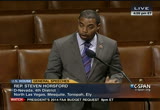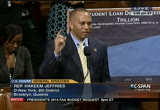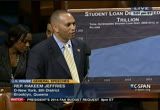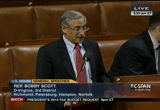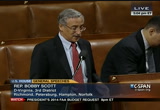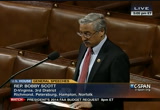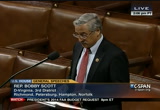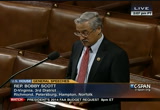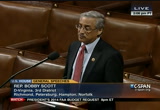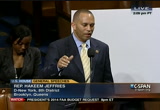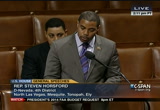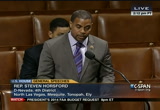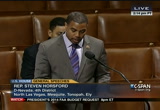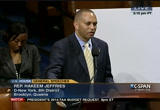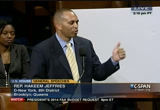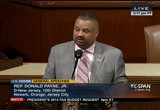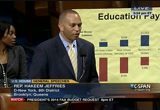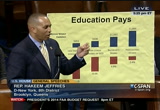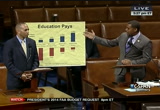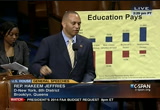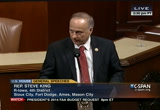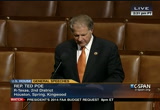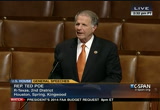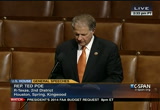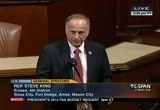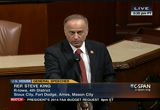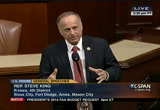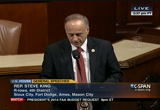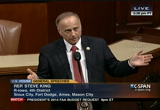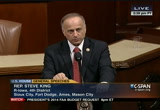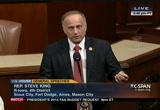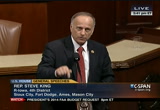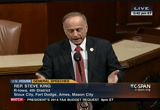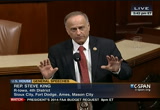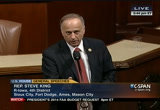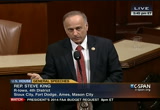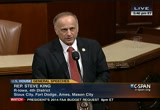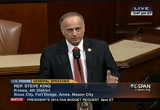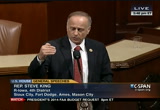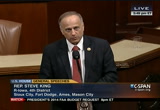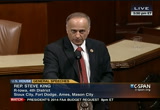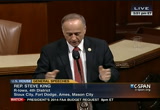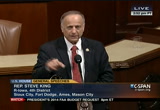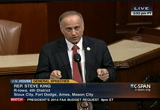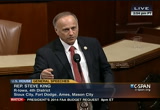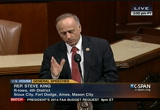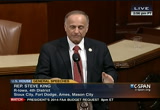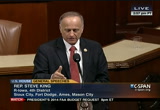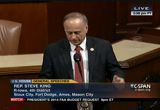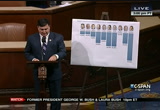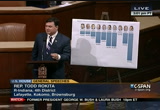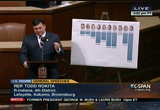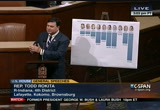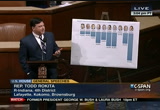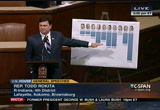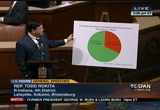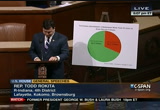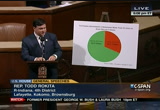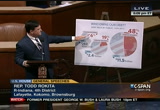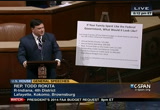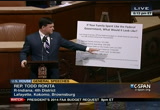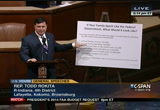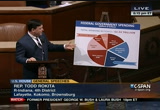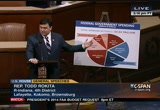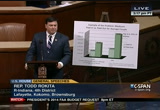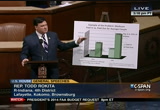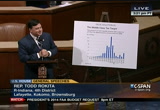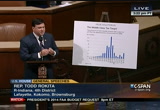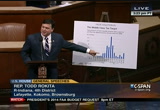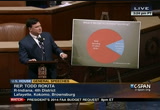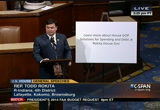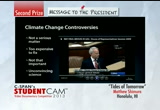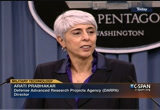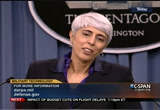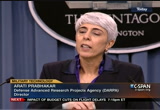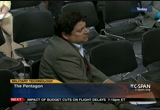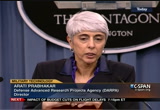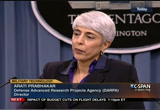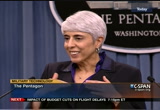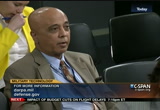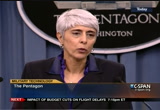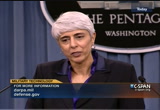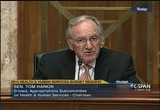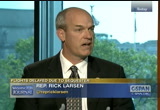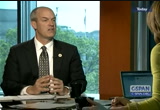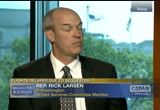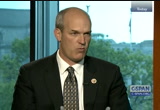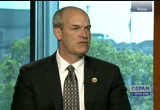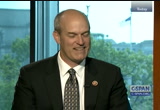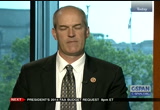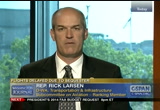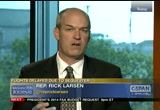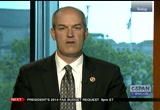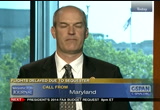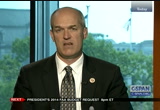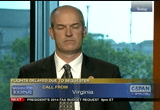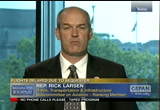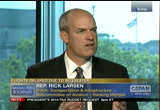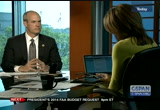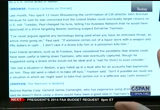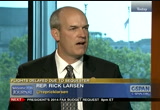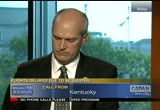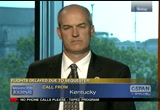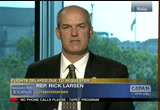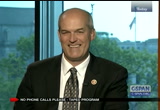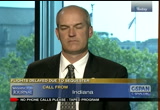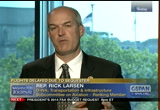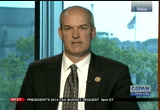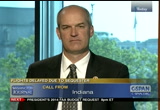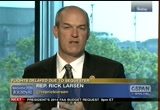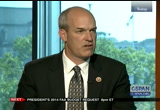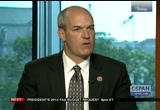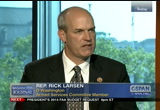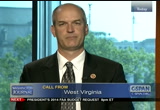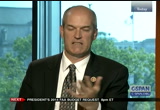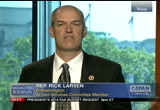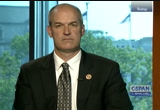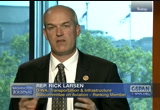tv Public Affairs CSPAN April 24, 2013 5:00pm-8:01pm EDT
5:00 pm
in the very things that we know work and that will improve the successes for young people to succeed in life. i yield back. mr. jeffries: i thank the gentleman from the silver state for those very astute observations. as representative horsford pointed out, a budget ssentially is a choice and a pathway forward that people in this chamber are making decisions based on what they see as best for america. . the republican budget that was passed by this house, as representative horsford has indicated, in total would cut $168 billion in spending on higher education. that's a value choice. so walk away from young people
5:01 pm
in america, young people who already are being saddled in excess of $1 trillion in debt in total. what else does that budget do? it says we're going to take the p tax rate which is at 79.6% for millionaires and billionaires and the well-off and slash that tax rate down to 25%. so we're going to cut education spending for amongst other reasons, to cut further the taxes paid by the wealthy and well-off in this country. that is a choice that is bad for america. it's bad for the middle class, bad for working families and bad for our future. we have been joined by the distinguished the gentleman from virginia, an expert in all
5:02 pm
matters pertaining the budget in this congress, among other things. let me concealed to you for a moment. >> we want to take a break to yield to the chairman of the rules committee. i understand there's a report from the rules committee that needs to come forward at this time. we'll yield the time that the gentleman needs. mr. bishop: you want your bill pushed out. i send to the desk a report from the committee of rules for filing under the rule. the clerk: report to accompany house resolution 178, resolution providing for consideration of the bill h.r. 527 to amend the helium act to complete the provocation of the federal helium reserve in a competitive market fashion that ensures stability while protecting the
5:03 pm
interests of the american taxpayers and for other purposes. the speaker pro tempore: referred to the house calendar and ordered printed. mr. bishop: thank you for the yield. the speaker pro tempore: the gentleman from is recognized. mr. jeffries: i was in the middle of introducing representative scott, an expert in the budgets that have come out of this house of representatives and it's my honor and privilege to now yield to him. mr. scott: thank you and thank the gentleman for yielding and thank him for his leadership on this issue and many other issues that he has been working on, serving on the judiciary committee together. but, mr. speaker, i rise today to talk about an issue that is important to our society and that is access to higher education. our nation's economic competitiveness depends on our ability to educate our next generation.
5:04 pm
we compete with nations all over the world for business. and our competitive advantage is in our education. we're not going to compete on low wages. there are people who work for much lower wages and so we aren't going to win the battle of the race to the bottom on wages. we aren't going to win the battle of requiring co-workers to work near their co-workers. if you can -- have a mode em, computer, if you can work across the hall, you can work across the globe. no reason to have people located here in the united states and if you can manufacture goods anywhere in the world, you can have them delivered anywhere else in the world. you don't have to be there to be close to your customers. and used to be a time if you wanted to build a manufacturing plant to get financing, it had
5:05 pm
to be here in the united states. now we have worldwide banking. you can build that plant anywhere in the world. the reason businesses want to locate in the united states is because they can get a well trained and well educated work force and we need to make sure we don't fall behind because that is our economic competitive advantage. we know that neighborhoods rely on education because those neighborhoods that have high investment in education less likely suffer from crime and pay for social services. and we know that individuals benefit from jation. there is an old addage, the more you earn, -- the more you learn, the more you earn. and in this economy, it depends on the education that you get. in fact according to the department of labor, 90% of the fastest growing best paying jobs in the united states will require some jation past the
5:06 pm
high school level, not necessarily a four-year college, maybe a community college or career jation, but some jation past the high school level. and while the benefits of getting an education are important and well known, how to get that education is becoming a challenge. people have to pay for that education. now many people apply for financial aid, scholarships, ans and grants and also pell grants. it provides up to $5,500 a year for an education. unfortunately for many students, although the pell grant used to cover the cost of tuition, rarely does it provide the tuition today. the college board suggested the average cost of tuition is over $10,000. many public colleges charge as
5:07 pm
much as $22,000. so that a student has to come up with as much as $15,000 over the pell grant to be able to afford tuition, room and board. under most circumstances, students can obtain student loans to cover the difference. it's also critical that students know what they're getting into when they take on student loans, because these are not grants and these are loans that have to be paid back with interest. we have been helping students with these loans. when we passed the health care reform a couple of years ago, we included $1.5 billion to strengthen the income-based program that allows students to cap their monthly -- student loan payments to 15% of their discretionary income. we need to do more. the college cost reduction and access act, which was signed in 2007, included a reduction in
5:08 pm
the interest on the student 3.4%. rom 6.8% down to that expired last year, but we extended it and we need to extend it again and even make it permanent so that the loan interest rate doesn't go up again. there is other legislation pending. congresswoman karen bass, 10 hive 10 program that will allow payments to be made up to 10% of your discretionary income for 10 years and the rest can be written off. there are other things that are pending. but, mr. speaker, we need to make sure that every student that studies and is prepared for college has that opportunity. we need to make sure that no student is discouraged from enhancing education because they don't believe they can afford it. making to do what we can
5:09 pm
those opportunities real. our nation depends on it. our neighborhoods depend on it. and our next generation depends on it. thank you very much. and i thank the gentleman for yielding. mr. jeffries: we both sit on the judiciary committee and in the context of our service on the judiciary committee will be presented with an opportunity to deal with the issue of comprehensive immigration reform, already two hearings have been held on this matter. and one of the issues that has consistently come up is the need h increase the number of 16r7b visas for highly skilled immigrants in the stem field, science, technology, engineering and math. the innovation economy and sector in this country has taken off and there are actually opportunities, some estimate approximately 20% of the work force has openings in the
5:10 pm
technology and innovation sector that many would like to see filled by opening up the opportunities for highly skilled immigrants. it's an approach that i think shares bipartisan support, but simultaneously, many of us believe that as a country we must invest in stem education for our children and our young people to make sure that moving forward, they have the opportunity to develop careers in the stem field in a manner that will benefit themselves, their families, their communities and by extension, the country. and so before i yield to the distinguished the gentleman from new jersey, i believe that representative horsford had an observation or two to make in the area of the need to invest in stem education. mr. horsford: thank you, representative jeffries.
5:11 pm
and you provided the clear nexus and while the congressional black caucus working with our colleagues from the hispanic caucus and asian pacific islander caucus support comprehensive immigration reform including provisions that allow the best and the brightest from ruined the country to come to the united states and to contribute to making our country great, we also believe that there should be investments here in the united states to educate those of us here for these careers in the 21st century. colleges and universities in our country will produce three million stem majors in the next 10 years. still according to a 2012 report by the president's council of advisers on science and chnology, our economy will
5:12 pm
demand more students graduating with stem degrees than we are currently providing. so what can we do? we need to increase funding in stem education and follow the lead of our historically black college and universities and hispanic-serving institutions, which are producing a greater share of students with stem degrees. mong hbcu's they produce about 19% of all stem bachelor degrees. 38% of which are in the biological sciences. 31% in math. 35% in computer science. 34% in the physical sciences. and 22% in engineering. now the obama administration has requested more investment for stem teachers, and additional funds to expand effective models of teacher preparation to help
5:13 pm
train 10,000 stem educators per year. that's what the president's budget proposes. those are the same priorities. they are the right priorities and the priorities that the congressional black caucus agrees needs to be supported by this congress. we need to invest in teachers that will train students for jobs in the 21st century. but let me be clear. you can't expect students to graduate with degrees in science, math, engineering and technology if we're not doing more to invest in pre-k and to help students start with a strong foundation. and that's why the president has a historic level of investment in his budget for early childhood education and pre-k. we enroll most kids in this country at five or six years old and we should be starting themmerier. 50 years of research tells us
5:14 pm
critical development in learning happens before the age of five. when schooling starts at kindergarten and first grade, it denies these young people chances to make the most of this critical period. fundamentally reforming our education system begins with high quality pre-kindergarten programs. in my opinion, pre-kindergarten gap. sing the achievement teachers getting kindergarten they have had two years of early education, they're seeing that the achievement gap has stopped or been narrowed. that's why we need to invest in programs like head start so we don't have to play catchup later or deny these young bright minds the opportunities to go into the fields of the 21st century. an and speaker, this is
5:15 pm
also stragy, not either or. we can invest in early childhood education and higher education, not cut slash or deny these opportunities to america's children. these are our priorities and it's what we will continue to fight for for all of america's children. i yield back. mr. jeffries: as was noted earlier, the c.b.c. believes there are children all across america and many inner city communities and in the neighborhoods i represent back home in brooklyn and east new yiled, parts of coney when the public school system decades, them for generation after generation after generation subjected them to a broken school system, from a very early point all the way
5:16 pm
through high school, and unless we invest in turning these roken systems around, we are essentially at risk of dooming young people to life sentences of disadvantage and despair. that's why the c.b.c. supports the president's proposal and his budget to invest an additional $75 billion over a 10-year period, as representative indicated, in early education, to give every american child the opportunity to be successful by putting them on an even plain with those who get the benefit of a first rate public or private school education. i want to yield to the distinguished the gentleman from new jersey, another dynamic
5:17 pm
member of the freshman class, representative donald payne juor, who is a leader on education issues prior to arriving in the congress and continuing to demonstrate leadership in this area. i yield to the distinguished the gentleman from new jersey. . mr. payne: thank you. i want to thank my colleagues, congressman horsford of nevada, congressman jeffries of new york for aingoring tonight's c.b.c. special -- for anchoring tonight's c.b.c. special order. the recession, the economy, violence and gun control, the security of our nation, these are the pressing issues being debated across this great nation today. however, efforts to address the issues are being undermined by our nation's educational
5:18 pm
deficit. adjustment f. kennedy said that our -- john f. kennedy said that our progress as a nation no swifter than our progress in education. the human mind is our fundamental resource. true to the statement are struggles that we face as a nation because of our divestments in our human mind and potential. in the past, the u.s.-led the world in several categories including college graduates and innovation. unfortunately, there's been a rapid decline in our ranking in these areas that directly correlate to the strength of this nation. among these things, the u.s. has dropped severely in academic rankings compared to other developed nations. about 33% of our nation's fourth grade students are proficient readers. nearly 7,000 students drop out
5:19 pm
of high school daily, and about a third of first-year american college students are required to take at least one remedial course. globally, our rankings have fallen to our students in reading to 14th, in science to th and in mathematics to 25th. despite these daunting statistics, the u.s. continues to lead the world in competitiveness, patents, media, mobile and research universities. but imagine the leadership that we could hold in the world if we strengthen our investment in education. our nation continues to be at a loss due to the untapped potential of our students, especially students of color and low income. for this particular population, the statistics are even more daunting, but the potential is greater as well.
5:20 pm
42% of black students attend schools that are underresourced and performing poorly. 28% of our core academic teachers at minority schools lack the appropriate certification. black children, especially boys, are more likely to be classified and placed in especially education than their white counterparts. black and hispanic males constitute 80% of the youth in special education programs. black boys are 2.5 times less likely to be enrolled in talented and gifted programs even if their prior achievement reflects the ability to succeed. yet, despite the demoralizing facts, despite the failure of the american education system to properly educate these students, nearly three million college students in america are african-american. and only 13% of the u.s.
5:21 pm
population, black students represent 15% of the college student population. currently, these are beating the odds, but imagine how we could develop and succeed as a nation if we changed the odds for these students and close the opportunity gap. what if we strengthened our education system and allowed children to reach their full potential? what if we forced an environment of innovation and leadership for the nation -- for this nation's -- for this nation's outcomes in all communities equally? we have long held the solutions to address these issues, but they aren't coordinated or connected. we have the potential to reach new heights as a nation, but it requires a stronger education system as well as solutions and resources to change the odds for our children in the most
5:22 pm
distressed communities. i will be introducing the promise neighborhoods act soon to do just that. the promise neighborhood act initiative represents an unprecedented effort to work across silos and develop a comprehensive cradle-to-career pipeline for children in istressed neighborhoods to holistically hold barriers to success. it would foster continued collaboration on the local level to build similar pipelines in communities across the country. woven, ine, tightly would be expected to provide, among other things, prenatal education and support for expecting parents and high quality of education in early childhood opportunities including a full day and a full year kindergarten and
5:23 pm
prekindergarten. high-quality schools successfully out-of-school time and community engagement, support for transition to elementary school between elementary school and middle school and from middle school to high school. meaningful family engagement and capacity building. college and career readiness activities, including college counseling, subsidizing employment and opportunities in arly education programs. neighborhood-based support, college-aged students for these neighborhood jobs. the modeling engages the community to collaborate and end fragmented delivery of programs to develop a pipeline for progress would demonstrate in successes. this would eliminate the opportunity gap for low-income children and children of color and set a new standard for
5:24 pm
education and success in this country. though not realized, our nation holds a great deal of underdeveloped potential and it lies within our human capital. investing in education will strengthen our nation as a whole and position us once again to lead the world. education is the single investment that unequivocally develops our economy and strengthens our future, and with that i'd like to thank you and i yield back the balance of my time. i horse horse i want to thank the distinguished -- mr. jeffries: i want to thank the distinguished colleague from new jersey for his observations. mr. chairman, how much time is remaining on this special order? the speaker pro tempore: approximately five minutes. mr. jeffries: thank you, mr. speaker. i want to thank the representative from new jersey for making it clear that all children in this country deserves the opportunity to be part of a pipeline toward
5:25 pm
progress and prosperity, even though some unfortunately have been subjected to circumstances that often lead to a pipeline from the schoolhouse to the jail house. that's not how things should be anywhere in america, and that's why we believe a robust investment in education is the right way to go in this country. and this chart -- and i'm going to ask the distinguished gentleman from the silver state for his observations. what this chart illustrates, education pays. that if you invest in education, increase the level of degree attainment, what it does is it increases the capacity for americans to earn a better living. and so for example, for americans who have less than a
5:26 pm
high school diploma, their , erage weekly earning is $451 but someone with a high school diploma earns on average $638 per week. and someone with a bachelors degree earns on average $1,053 per week. if you give an american an vanced degree, their average earnings per week increase in excess to $1,600. investing in education pays for the american people. i yield to my distinguished colleague from nevada. orse horse just to e-- mr. horsford: just to elaborate. it is not only the investment n the individual that proves
5:27 pm
great difficult -- dividends but the failure to invest, based on the bottom line in red, for someone with less than a high school diploma, the likelihood of them being unemployed, 14%. for those with a high school iploma who are unemployed, 9.4%. if you have a bachelor's degree, the unemployment rate drops in half to 4.9%. and if you have a professional degree, those with professional degrees, the unemployment rate is .4%. so the correlation is clear -- unemployment rate is 2.4%. so the correlation is clear. with education attainment comes economic prosperity, opportunity and a return on investment that is good for that individual, their ability
5:28 pm
to provide for themselves and their family and for our entire country. and so, mr. speaker, when we talk about investment, we're not talking about investments in programs or systems. we're talking about investments in people. when we talk about head start, we're talking about 3 and 4-year-old children. when we talk about title 1 funding, we're talking about schools and children that are identified as having low-income needs and the disadvantaged. when we talk about individuals with disabilities education act, we're talking about individuals. and the more that we can invest in the individuals in america, the greater return we will have in the productivity of that individual, their family, the community they live in and that will make for a stronger america for all of us. and that is what we are
5:29 pm
aspiring to accomplish in this 11h congress. we want to work with our colleagues on the other side. where they can meet us in the middle to find solutions to make these investments, we look forward to working with them. but one thing we will not do is to flash -- slash, to fund or freeze the investment of the american children and the american family. i yield back my time. mr. jeffries: i thank the gentleman from nevada. we will not, as he indicated, support any budget that balances itself on the backs of children or young people or college students in america. and unfortunately that is the budget that has been put forth by my colleagues on the other side of the aisle. we support a balanced approach to dealing with the economic problems that we have in this country, that involves the investment in education.
5:30 pm
that is what we stand for. that's what's good for america, and i yield back the balance of my time. the speaker pro tempore: the gentleman yields back the balance of his time. under the speaker's announced the of january 3, 2013, chair recognizes the gentleman from iowa, mr. king, for 30 minutes. mr. king: i have listened to the dialogue over the last 30 to 60 midgets and i'm surprised that advocates for the immigration reform bill wouldn't look at the impact on their friends and neighbors and we see the highest unemployment in the african american community. i ask the gentleman to reconsider. the best thing would be more jobs for people that are here that are americans. i see the gentleman from texas
5:31 pm
has arrived and generally there is a pretty good narrative that comes forth from the gentleman. he i will yield to the gentleman from texas, mr. poe. mr. poe: i thank the gentleman from iowa for yielding some time. i want to address the house on a different issue tonight, but i do appreciate the time and let me be off subject that he was ing to and will talk about momentarily. but mr. speaker, as you know, there are people in boston and really around the world and in the united states especially trying to recover from the terrorist attack that took place in boston. the richard family laid their eight-year-old boy to rest as did other families. as a father of four and grandfather of 10, no parent or grand parent ever wants to see a child die in their youth,
5:32 pm
especially being murdered the way this young lad was. but meanwhile in the halls of academia, an official with the united nations human rights council, he blamed the terrorist ttack on what he claims is american global domination and on the country of israel, of all mr. speaker, why is richard falk still employed by the united nations human rights council and can someone please explain why the united states continues to be the largest
5:33 pm
funder of the united nations which gives radical wing bats like falk to spew their hate and anti--american rhetoric. i don't think the united states should be bank rolling them. let them find somebody else to foot the bill for this international institute of ingratitude and it's time for he uninformed like mr. falk to go. and it's time for the united states to stop funding the human rights council. we don't need to pay people like professor falk to hate america. people like him will do it for free. and meanwhile, let's try the boston terrorists for their crimes against america, hold them accountable for murder and don't try to blame america for the murder of america's children. blame the killers. and that's just the way it is. and i appreciate the gentleman
5:34 pm
from iowa. and i yield back to the gentleman from iowa. mr. king: i thank the gentleman from texas for his message and one that i hope is well heard across america. you don't have to pay them to hate us. they do hate us for free and hate us for our ideology and success and for all of those reasons. mr. speaker, i came here to the floor tonight to talk about the immigration issue here in the united states congress, primarily what has emerged in the united states senate out of the gang of eight. we know some of these policies are being worked through in meetings behind closed doors in the house of representatives. --y admit to those meetingsb meetings. i just get nervous when i see bills written in secret. the gang of eight wrote their bill in secret and popped it out last week or so, and we began to look through 844 pages.
5:35 pm
surprise. shortly after the bill is dropped, then the chairman of the judiciary committee in the senate calls hearings and begins to do the fastest process that they can legitimately get done to try to move immigration, amnesty bill out of the senate before they get so many holes poked in it that it sinks of its own weight. how did we get here? what was the scenario? what is the path of immigration and i'll go through the fast-forward version backing this up to 1986. 1986, it became a political issue that we had too many people in the united states illegally. there was an effort made to resolve the issue and the effort was this, part of the people in the argument said, they wanted better border security and better immigration enforcement. and the other side of the argument said we have to do something to legalize people that are here -- i don't know if they used the language then,
5:36 pm
that were in the shadows or not. those two arguments came here in this congress and with president reagan sitting in the white house, he received significant pressure from the people around him that urged him to sign the 1986 amnesty act. now that was one of only two times that ronald reagan let me down in eight years and accepted the argument that the only way to get agreement on enforcement and restore the rule of law was to make the people that were here illegally legal. and the tradeoff was amnesty in exchange for enforcement. mr. speaker, the projection originally was 800,000 people in this country illegally that would get instant legalization status and that number grew to one million. roughly that was the projected amount at the time that the bill was debated in congress. we know it wasn't one million people but three million people that ended up receiving amnesty
5:37 pm
from the deliberations in this congress, the tug of war that came together and it's a product of compromise. and i would point out that compromise isn't always a good thing. this would be one of those examples that compromise was in exchange of the promise of future enforcement, ronald reagan would sign the bill to start the process to legalize the people that were illegally in the united states. sounds familiar. he signed the bill in 1986, and what we got was legalization of the people that were here, triple the number that was projected and the effort to get law enforcement was undermined continually and it was undermined in a number of ways, through litigation, through lack of will. and as this ground forward, perhaps -- as it ground forward, the respect for the rule of law, especially with regard to immigration law diminished each year. and as we have seen, the
5:38 pm
enforcement of our immigration laws has diminished in each administration from ronald reagan through bush 41 to bill clinton to bush 43 and now to barack obama. that's the path that has taken place. just a year ago, the debate was, should the president or would congress pass the dream act. the dream act being the legislation -- i'll say the chief advocate forward in the senate was senator durbin and identified with it more than anyone else, but the dream act, kids that came hearsay before their 18th birthday and goes down to 16, those who came here when they were relatively young maybe due to no fault of their own, theoretically someone who was born five minutes before in a foreign country and brought in by their parents as a little baby, would get a legal status and in-state tuition discount
5:39 pm
and go to college and get legal status and work in the country. in other words, it was amnesty for those young people who were presumably came into this country not of their own will or perhaps not of their own knowledge that it was against the law to enter the united states illegally or those brought into the country under a visa, overstayed their visa and didn't have a legal status anymore. the younger people getting a path to a legal status and legal green card here in the united states. that's the dream act. a year ago, mr. speaker, it was not -- it was not something that could pass the united states congress. they wanted to get it passed, but it did not because we stood on the rule of law and said we are not going to reward people who break the law with a defacto scholarship to a university and in california, it would be a free ride and how can you
5:40 pm
legalize people who are here illegally and the clear directive of the law and have people sitting in a classroom in, say, california, with a free ride while someone who has lost their husband or wife in battle in iraq or afghanistan, who finds themselves the sole bread winner wants to go into california and pay out-of-state tuition at a california institution who is a widow or widower and sitting next to someone who is in the united states who gets a ride because they have been declared a california resident. i could never reconcile the unjustness of that idea and neither could a majority of the americans or the united states congress. that's why the dream act wasn't passed. just a year ago, that couldn't be done. and the president said on march
5:41 pm
28, 2010, when he was speaking to a high school group here in the washington, d.c., area, they said why don't you pass it by executive order. the president's answer is i don't have the constitutional authority to do so. that is a legislative branch activity and he said, you're smart, you are educated, you know the three branches of government, congress' job is to pass the law. as head of the executive branch, my job is to carry the laws out and see they are enacted and enforced and judicial branch is to rule on their constitutionality and tell us what the laws mean. that is the president's description, and said he didn't have the authority to implement the dream act. congress wouldn't pass it a year ago. the president said he couldn't do such a thing constitutionally. march 28, 2010 and we have come
5:42 pm
so far that in june or july and i don't have the dates in front of me nor committed to memory, mr. speaker, the president went back on his own advice, word, oath of office and counsel when they issue executive memorandum and held a press conference at the white house within a couple hours of the executive memorandum and said we are going to legalize all of these people that are here within these age groups. an executive edict. it was only a memorandum between the department of homeland security they put out and they would follow this guideline. they created four classes of people that were defined by age and by status, but four separate classes of people created in this memorandum. and the president manufactured a work permit out of thin air, mr. speaker. just simply made it up. all of the visas that exist in law, of course, are a product of
5:43 pm
congress. and it's our exclusive authority to define immigration law. it's the president's job to enforce the laws that are on the books. now, the previous president had the opportunity to veto immigration law. it is the law of the land. the constitution is the supreme law of the land. the president violated the constitution and his own definition of congressional executive and judicial authority when he -- when he issued this executive memorandum that granted this legal status under the dream act principles. that happened i would say june or july of last year. now a quantum leap. we had a meeting shortly after that and organized the effort to take the president to court on that issue. you cannot have a president that is going to legislate by executive edict and he did do
5:44 pm
that and that case has worked its way through the courts and i'm here to announce in the congressional record. the name of the case is crane versus napolitano and this is the lead plaintiff, christopher crane, president of the i.c.e. union. he has been a stellar individual on this. he stood boldly and strongly and taking the threats that comes from all sides of this argument and has testified before congress. he has stood at a press conference and asked to be recognized to ask questions of senators over on the senate side. and he has been flawlsly walked his way down through this thing by standing for the rule of law and for the constitution and his own oath to uphold the law, as we have taken that oath here in this congress to uphold the constitution. this decision that came down yesterday from a federal district court in houston in the
5:45 pm
case of crane versus napolitano, 10 points made in this litigation, mr. speaker. nine of the 10, the judge found clearly down on the side of those who support the constitution and the rule of law and rejected the executive branch's argument that they had prosecutorial discretion to decide who to prosecute and who not to prosecute. and time after time, the judge wrote, when congress writes in statute, the word shall, shall means shall. it doesn't mean may. it means shall. that means when an i.c.e. officer picks someone up and identifies them as likely to be in violation of immigration laws, they shall be placed in deportation proceedings. that's a shall that's in the law that was upheld by the court yesterday in their decision in decision. le-paged
5:46 pm
. the 10th argument is when the president sent it back to the executive baverage and said it is illogical and tied to footnotes, go back and rewrite your argument, but all the implication of the tone of that, once it's rewritten -- i don't want to put words in a judge's mouth -- i want to know how the final ruling will be. it's 100% resounding decision that says barack obama and his appointees cannot write immigration law out of thin air. they can't do so by executive memorandum. they cannot do so by edict. they cannot do so by executive order. congress writes immigration laws, mr. speaker. and the president's job is to take care that those laws be
5:47 pm
faithfully executed. he has not done that. he's defied his own oath of office. the supreme court ruled on the side of article 1 legislative branch of congress. and we'll see the impact of this decision. i think, mr. speaker, that now it's time for the gang of eight to reassess as a result of this lawsuit. 's time for open borders advocates in this to reassess as a result of this lawsuit. the people concluded, the people on my side of the aisle, mr. speaker, appeared to have concluded that republicans didn't win the elections they anticipated winning last november. and on the morning after the election, we had some of our otherwise wise folks on our side of the aisle concluded that mitt romney would have been president elected if he hadn't said two worts, self-deport. and so -- two words, self-deport. now let's start the conversation with select groups
5:48 pm
of people across the country that would require that amnesty pass to, start, quote, the conversation, closed quote. mr. speaker, i urge all of those to reassess the situation and think about this. they were seeking to conform to the president's edict on his dream act life. they were seeking to adjust u.s. law under the premise that the president refused to enforce existing law and the only way that we could get law enforcement would be to conform to the president's wishes and rewrite the law and conform it to the president's political agenda. well, i thought from the beginning it was a ludicrous sionoake, to accept an idea that the president can first write a law by executive edict and, second, congress has to conform. i saw it and participated in this congress, mr. speaker, when we have a piece of legislation and finds its way
5:49 pm
over to the supreme court and the supreme court comes down with a ruling and then congress takes a look at the ruling and we will bring a piece of legislation to conform with the directive from the supreme court. i think that's an appropriate thing for us to do, provided we agree with the supreme court's decision and its clear, logical and legal analysis. an example would be the language on partial birth abortion. the first time it went to the supreme court, the supreme court ruled that the definition of partial birth abortion was too vague. and so we went back and fine tuned that language, pass it out of the judiciary committee, pass it out of the house and senate, president bush signed it and it was upheld when it found its way back again before the supreme court. that's ok. if is appropriate thing to do, to conform our legislation to a supreme court decision when
5:50 pm
it's a proper one. but when the president defies the laws and the policies established by the united states congress and makes up his own as he goes along which executive edict and press conference and for congress to accept the idea that the president of the united states directs us, either implied or literally, to conform the law to the president's wishes, i would remind all of those people that happen to think that, mr. speaker, that we each have our on franchise. our oath is to uphold the constitution. it's not to conform to the president's whims or wishes. and it's to represent the best decisions for this country and to represent the people in the districts that we represent and we owe them our best judgment and our best effort. but we don't owe anybody the s wishes, will or orm to the whim. it has to conform to our best
5:51 pm
judgment, individual best judgment, collectively measured in this house and senate. and so i think a congress that will give up its legislative authority and give its power over to the executive branch by conforming the idea of amnesty that the president has brought forward in his edict, i don't think the founding fathers would imagine that each branch of government would be so willing to give up its power. our founding fathers imagined that each branch of government would jealously guard the power that's granted it within the constitution in the three separate branches of government. they expected that congress would assert its authority and competition with andess at that timic tension with the president and with the courts -- and estatic tension with the president and with the courts. the gang of eight brought their bill out. wh is it?
5:52 pm
it's this. it's amnesty first. instantaneously legalizes everybody that's in the country illegally with a few tiny little exceptions and ask we run across them randomly and they helped to have committed a felony or three misdemeanors, that's then -- other than that, it instan taint ousley legalizes everybody here -- instantaneously legalizes everybody here, whether they overstayed their visa, whether they committed the crime of document fraud, those kinds of things are simply not enforced by this administration. they are treating immigration laws as it's a secondary crime. an example of that would be if you have states and say you can't pull somebody over for not wearing happens they're not wearing their seat belt, you can write a ticket for that. that's what's happening here. the president issued this edict, if somebody is guilty of a fellly and unlawfully in the united states, then ale -- felony and unlawfully in the
5:53 pm
united states, then we'll go ahead and deport them. they'll get a similar treatment -- the president's aunt who was adjudicated for deportation, lived in the country illegally for years after that, finally she surfaced again and they granted her asylum status because if she went back to kenya she would be subject to kidnap and ransom. same goes with the president. i guess that's the same for the president's uncle omar, he had already been adjudicated for deportation. we would know if he was still in the united states of america. the president doesn't -- the law didn't apply to the president's relation, and i guess in order to conform with that, the president would like to exempt everybody from the same law that his family has been exempted from. i disagree. congress writes the laws. the president's job is to carry them out. in this gang of eight's legislation, it's instantaneous amnesty for everybody, and that's breathtaking in the magnitude of it.
5:54 pm
they say 11 million. i say 11 million, 12 million, more likely 20 million. and here's what i would guarantee you, mr. speaker. if they move legislation out of the senate and if it does come to the house, along the way if any of us introduce an amendment that would cap the legalization number at their estimated number, they will never support such an amendment because they know it's a lot more than 11 million people. instantaneously amnesty for 11 million or 20 million or more people and that's good enough for them. they also had to write in the bill, if you have previously been deported and you find yourself waking up in a country that you're legal to live in, we still send an invitation through this bill that you should apply to come back in the united states. we really didn't really mean it, mr. speaker. didn't really mean it that people were deported for violating the immigration law if they'd like to reapply
5:55 pm
unless they have a felony conviction or three misdemeanor convictions, they'll give them a path back to the united states. this isn't just amnesty for those who are here now. this is amnesty for those who have been sent home as well. an absolute open door policy, and the tradeoff is, what, amnesty first, the promise of enforcement, the same thing that came along in 1986, multiple times since then. amnesty for the promise of enforcement and the promise of enforcement is that janet napolitano is to produce a -- within five years a plan to get 90% operational control of the critical sectors of the border that she designates. and that 90% of those that we see, of course, because you can't count those that you can't see. so they want to be able to catch 90% of those you can see. we don't know if they'll turn their eyes the other way. here's what i know, we'll never see the enforcement side of this. it's amnesty first. promise of enforcement second. that has never worked.
5:56 pm
if they were serious they would go to work and secure the border, shut off the jobs magnet, restore the respect for the rule of law. we would know in this country if there was respect for the rule of law restored. and at that point i'm ready to sit down and talk. i'm ready to have that conversation. but absent the re-establishment of the rule of law, and that means border control, serious border control, we got the resources to do it, mr. speaker. it's not that we don't have. we're spending over $6 million a mile on the southern border. you can build a four-lane interstate across iowa cornfields for $4 million a mile. you can bite the right of way, you can engineer it, do the archaeological, environmental, you can grade it, you can put the drainage in, you can pave it, you can paint it, you can shoulder it, you can put fences on it, all of that for $4 million a mile through iowa cornfields. you cannot convince me that we
5:57 pm
couldn't take a third of that $6 million a mile and in a few years build the finest, most sophisticated barrier along our southern border, and we can take some lessons from the israelis, for example, 99.9% efficient rate in their border barrier, they do that because their lives depend on it. so do ours in a lot of ways, mr. speaker. it's not that hard to build infrastructure and add to that infrastructure the devices so that we can actually get the warning signals when people do get across such a barrier. we can do it with the resources we have. we can do it in the 90 percentile of efficiency with the money that we have. and we can shut off the jobs magnet. all we need to do is pass the new idea act. idea. the illegal deduction elimination act. it clarifies the wages and benefits paid to illegals are not tax deductible. it let's the i.r.s. come in. under their normal auditling
5:58 pm
process they would run the employees through everify. when they run the employees through everify, we would give the employees safe harbor if they use everify. that's a nice comforting thing. each employer would want to have that. if the i.r.s. concludes that you knowingly and willfully or neglectfully been employing illegals, they would rule that wages and benefits paid to them is not a business expense. that means out of your schedule c, that money comes out and goes over into the gross receipts again, shows up in the bottom line as taxable income, and your $10 an hour illegal employee turns into a $16 an hour illegal employee and it becomes the prudent business decision on the part of the employer to use everify, clean up his work force. so there's two simple things, mr. speaker. we can provide that border security with the resources that we have by adding infrastructure, adding and utilizing technology in addition to, and i have not
5:59 pm
said 2,000 miles of border fence, a fence, a wall and a fence. we just build it according to the directives of the secure fence act and keep building it until they stop going around the end, shut off the jobs magnet, restore the rule of law, then let's have a conversation, mr. speaker. but until then, i'm going to stand on defending the rule of law. i appreciate it, mr. speaker, and i would yield back the balance of my time. the speaker pro tempore: the gentleman yields back the balance of his time. under the speaker's announced the of january 3, 2013, chair recognizes the gentleman from indiana, mr. rokita, for 0 minutes. mr. rokita: i thank the speaker. mr. speaker, i rise today to talk about really the most
6:00 pm
important issue of our time in this country and really the world. we're nearly $17 trillion in debt and $100 trillion of debt in unfunded promises to our children and grandchildren, that they stand to inher its if we ail -- inherit if we fail to act. this is an issue that my colleagues and i on the budget committee take very seriously and i know that most members of this body take very seriously. to that end, we view our role as not only legislators but educators. and in our great state of indiana, i talk about this issue almost in a nauseating fashion to some, but i think it's very important that we as people, as americans, mr. speaker, understand what the situation
6:01 pm
really is. because at the end of the day i am very optimistic that when given the facts, the people of this country, as president reagan observed several years ago, will right the ship, will do the right thing, will start to live within our means again and they will take control over the situation. i don't think ultimately, mr. speaker, that the reform that is needed to solve this problem will actually start or come from this floor or the floor of the friends and colleagues that we have on the other side of the rotunda. the reform and the solution to this problem will come from main street, will come from the farm fields and the businesses and the kitchen tables of the great patriots across this land.
6:02 pm
so it's in that vein, mr. speaker, that i want to make a presentation here on the floor of the house. i also make this presentation because of the current situation that we're in with regard to our budgeting process. as i speak with you here on the floor tonight, mr. speaker, we have a budget that passed the house of representatives, we have a budget that passed the united states senate and after two months of being late, as it has been nearly every year that this current president has been in office, we finally have a budget from our president. now, the main difference, well, there are several differences, but the main difference i want to to point out tonight between these budgets is that the budget that came out of this house is the only one that balances. the only one that balances.
6:03 pm
now, why is that important? well, it's important because if you never present and pass a budget that balances, and let me remind you that a balanced approach isn't a balanced budget . someone's opinion of a balanced approach, like our president's, doesn't mean that the budget balances. no matter how many times he or house democrats say that. but the reason it's so important that a budget balances is because it shows your intent. it shows your intent to finally start paying off the debt. because like everyone knows, you can't possibly start paying nearly $17 trillion in debt until you get to a balanced budget so that you have a surplus, hopefully, and then in fact use that surplus to pay down the debt. so, if you present and pass a budget that never balances, you
6:04 pm
intend by what you're saying and doing there, to never pay off the debt. and i would submit that when you do that, you can't call it debt anymore. because what you're doing is stealing. you're stealing from future americans, you're stealing from children -- the children of tomorrow, the children that don't exist yet, and therefore have no voice in the matter because they can't vote and what an easy target they are. so when you pass and you vote for budgets that never balance, that's what you're doing. you're stealing. let's call it what it is, mr. speaker. now, i want to be clear. this isn't a partisan set of remarks, because it's not a partisan issue. in fact, it's very bipartisan. and this chart here shows that. going from beyond kennedy, but i just started tracking from president kennedy on, every one of our presidents who represents
6:05 pm
both -- who represented both parties since 1960's have accrued increasing levels of debt. even mr. clinton, with the help of this republican house, who had technically balanced budgets i think four times in his eight years, still overall ran up a ery slight debt. our debt problems did not start on january 20, 2009, with the inauguration of president obama. i want to be clear. but as this chart also shows, our problems, our debt problems have been increasingly and drastically exacerbated since that time. and we need to get this under control. let's take a look at exactly how much we're borrowing and what's causing this debt and i'm grateful for my help tonight -- the help tonight from my staff
6:06 pm
member, zach, who is here on the floor with me to help us get through these slide as little quicker. -- slides a little quicker. we are borrowing 31 cents of every dollar the federal government is spending. now, i'll admit to you, mr. speaker, that's actually improved. when i started making this presentation about a year and a half ago two, years ago, we were borrowing 42 cents of every dollar we spent. but thanks to some good revenue forecasts and especially the leadership right here in the house of representatives, week of been already to make some sensible cut, rein in spending that has decreased some of that borrowing. but again, until we stop borrowing, we cannot begin to start paying down this debt. 31 cents of every dollar, mr. speaker.
6:07 pm
now, let's also be honest. we've been in debt before as a country. and the question then arises, why should we worry so much now? well, we should worry now and let me explain why, by going back to the last time that this country was in this kind of debt. when our debt level, if you include the social security trust fund, reached nearly and over 100% of gross domestic product. and that time was right at the time of the end of world war ii. so what makes our situation so different now than the last time we were in so much debt? well, number one, the cause of our debt back at the end of world war ii is much different than now. the cause of our debt back then
6:08 pm
was in fact the war and it was a one-time event. i mean, one way or another, even back then, we knew it was going to end. if it ended well for us, if we won, which we did, we would have, as we did, a good economy coming out of that war, we would become a credit to the world and we would begin paying down that debt and in fact that's exactly what happened. the drivers of our debt today have no -- oh, and excuse me, if we lost world war ii, well, i guess it wouldn't really matter how much debt we had because we'd all be speaking perhaps a different language. this country may not even exist. the drivers of our debt today, however, have absolutely no intention, no intention of ending as they currently stand.
6:09 pm
and i'll get to that in a little bit. the drivers of our debt today are the social entitlement programs and the interest that we continually owe ourselves and other countries. the second difference between the last time that we had this evel of debt and now is who we owe this debt to. whack then during world war ii -- back then, during world war ii, we owe the debt to ourselves. nearly 100%. remember the posters, mr. speaker? remember when americans stood up, bought those bonds and we financed world war ii? increasingly, as this chart shows, our debt is owed to other countries. largest of which right now is china. and it's getting to the point
6:10 pm
where the debt we owe to other countries is nearly half our total debt. so, we increasingly have reditors who by definition don't have our best interests at heart. not like we did as individual americans buying those war bonds. and that's a problem. it's such a problem that it's become a national security issue . and that needs to be addressed as well. think about this, mr. speaker, with the interest that we pay ina alone on the credit they issued to us by buying our treasury bonds, etc., china with that interest payment every week can buy three new joint strike fighters if we'd let them, if those were in production.
6:11 pm
they can finance their military operations just on the money we give them. and in this increasingly complex day, new ging every threats, new risks, that is a particularly vulnerable place to be. and we are doing it to ourselves because of our refusal to balance budgets and otherwise live within our means. to put more on our pleats now -- plates now at the expense of our national security and at the expense of the children of tomorrow, people who don't exist yet and therefore have no voice in the matter. but i got to tell you, it's hard for me even as a budget committee member to visualize what $17 trillion really looks like, what it means. and i certainly can't understand
6:12 pm
or visualize what i said earlier about the $100 trillion that's on the way, specifically over the next 50 years to 5 years. -- 75 years, representing the promises we've made under these social entitlement programs. that's what's coming. in fact, our country will be bankrupt i'm sure and we'll be off the world's reserve currency long before we reach the $100 trillion. but it's coming and it's real. so what i'd like to do is take actual budget numbers and break off eight zeros from them so i can get them in a more manageable fashion. you know, the president has said, i've heard him a few times reference the federal government as some kind of federal family. well, i don't know if i'd take it that far. but let's assume for purposes of this debt discussion that the federal government acted like a family. here's what our federal picture
6:13 pm
-- budget picture looks like. our annual family income is $25,000. those are the tax receipts, the revenue that we get from the people of this country, the property, their property that we confiscate to run the federal government, some of it necessary, most of it increasingly not necessary. our annual family spending is $36,000. that's eight zeros lobbed off a rounded, real number. leaving us an annual debt that we have to put on the one family credit card of $11,000. so we're a family, we're making $25,000, we're spending $36,000, deficit of $11,000. it goes on a credit card, the one family credit card, that already has a balance, a balance of $168,000. future purchases on that credit card, the promises we've made to the wife and the kids over the years if they were to be put on that credit card now, $1 million
6:14 pm
. but wait main. wait a minute. remember i said -- but wait a minute. wait a minute. remember i said or borrowing has gone down. we're spending a little less. we have this quote-unquote drastic, incoherent ham-fisted, whatever thed a jecktifics we're hearing lately sequester, that's -- whatever adjectives we're hearing lately, sequester. that's cut 2% of spending. can you imagine what the other 98% of government does if all that have is supposed to happen on 2%? anyway, we saved some money. and this example, it would come out to $310. now, i will yield to any gentleman or gentlewoman member of the house here tonight that wants to get up here and defend this. and defend these numbers. i didn't think so. that's all right, mr. speaker, i will note for the record that there are very few members here.
6:15 pm
next slide, please. this is what your federal government spends its money on. i took the liberty of taking two pieces of the pie and pulling them out. and the reason i did that is because i want everyone to understand, when we vote for budgets, the line items we vote on really only are -- only represent those two pieces of the federal spending pie. our votes, every year when we pass a budget, only concern those two pieces. nondiscretionary -- nondefense discretionary and defense discretionary. that's whey we call it discretionary, we have discretion on dialing it up or tiling it down.
6:16 pm
the department of energy, the department of education and all the ones in between. but if you look at this, mr. speaker, most of the pie is mandatory spending. meaning it doesn't really come through the normal budget process because it can't. because these were promises that were made in the underlying law. they cannot be changed unless you change the underlying law. can't, as representative rokita, decide how much americans who qualify for social security will get in their social security check. the law sets that out. i don't get to decide in a budget document what services you get under medicare. that is set in the underlying law. medicaid the same way. interest is a contractual agreement. we agree to pay interest to our bondholders, that can't be changed. and then a smorgasbord of other mandatory spending rounds out
6:17 pm
what really is over 2/3 of our spending. 2/3 of your federal spending is on auto pilot. it's not adjusted year to year. it's not as simple as just cutting or lowering budget figures. in order to low they are debt we have got to reform the underlying causes of our debt. and that would be the social entitlement programs. now about this time, any member -- many members are probably ready to get up and claim 30 minutes in response on behalf of their constituents who say, i paid into those social entitlement programs. that's not the government's money, that's my money. week after week out of my paycheck. money went into medicare. money went into the social security account. for example. i paid in, therefore i get out. i want to acknowledge here on the floor of the house of representatives that that is
6:18 pm
true. you have paid in. we have paid in. we continue to pay in. but it's not the whole truth. as this chart indicates. you see on average, if you made $71,000 a year, you and your spouse, through your working lives, you will have paid in, this is an example for medicare, about 35% of what you're paying out. of what you're getting. 35% of what you're getting. and that 65% difference, quite honestly is paid for by the children of tomorrow. almost all of it. again, if you don't have any voice in the -- again, who don't have any voice in the matter because they don't exist yet. so the moral question we have as a country is how much more does a future generation have to pay so that we can have more on our plate now.
6:19 pm
when you have budgets that do not balance, you are happy to say, when you vote for budgets that don't balance, you are happy to say that we're letting them pay the loan and that's different. that's the first time, this is the first time in american history as i know it that we have basically said, we don't care, we don't care that our future generation, the next generation, will be worse off than us. at our very expense. but that's exactly what we're doing when we don't pass a a balanced budget. like i mentioned earlier about the $100 trillion, it's not just the current debt load that we carry, it's what's coming. and this was depicted by the red line here, you'll notice it's going nearly vertical. it's on a trajectory we may not
6:20 pm
be able to arrest, we might not be able to bend down back again if we don't get hold of it now. and this is what happens when 10,000 people a day retire into programs that go unreformed. and that's a problem. that's a big problem. and that's why it's so important to get hold of this problem now, to make these reforms now before we turn into greece. in our case, when that happens, it'll be a lot worse, not just for us but for the entire world. these figures do not lie. by the way, most of these figures i present tonight don't come from todd rokita's office they come from the budget committee. the good democratic members of the budget committee don't disagree with the numbers. i imagine there's disagreement, certainly i've seen disagreement on the committee about how to solve the problems presents, ta
6:21 pm
increasingly shocked and awed to hear members on the other side say that there really isn't a problem. -- a problem with the data. with the issue that the data presents. but nonetheless, the data is the data and the data does not lie. there's been some -- there's been offered some false solutions, i would say, to our problem of this debt and i would quikely like to dispel some of them and i'd like a point of order asking the speaker how many more minutes i have. the speaker pro tempore: the gentleman has eight minutes remaining. mr. rokita: thank you, mr. speaker. first false solution, we need more tax revenue. we're not taxing ourselves enough. only if we tax more, especially from the quote-unquote rich, those who haven't paid their fair share, quote-unquote, we solve this debt problem. let me address that for a minute. this is a -- this is one slide that doesn't come from the
6:22 pm
budget committee, it comes from the i.r.s., i have no reason to dispute it, i saw it in the "wall street journal" a couple of years ago and the bars represent where the money in this country is. the taxable revenue. where people's property is. and it's divided along income groups and if you look at the far right of this chart, you'll see that the top, the furthest right bars represent americans who have taxable revenue of anywhere from $1 million to $10 million. and the largest, the highest bars, where the middle is, represent americans who have taxable revenue of anywhere $500,000 a to year. the point of the slide is, you can take all the millionaires' money if you wanted. really make them pay their fair share. take 100% of what they earn and
6:23 pm
you'll have to assume two things, that they would continue producing, which of course they wouldn't, and you'd have to assume they'd continue living in the country, which i assume they wouldn't, look at the mass exodus going on in 57% marginal tax rate. but assume for the sake of discussion you take 100% of what they earn, you won't get enough revenue to pay off the debt. there are not enough oprah winfrey's, or when i'm in lafayette i say, purdue football coaches, to pay off this debt. if people are saying, like our president, that more revenue is needed to pay off the debt, they're coming for the middle class. they're coming for where the property is, where the money is. and that's people who make nywhere from $50,000, $75,000, $100,000. another false solution, let's
6:24 pm
just get rid of all that foreign aid. i'm the first to say we really got to examine who we give foreign aid to. i would also say, we don't give foreign aid necessarily to other countries so they can thank us. we to it because there's a strategic reason to do it. like our national security. but let's assume we cut out all foreign aid, you're only addressing about 2% of our federal spending. this is not something that you can solve the debt problem with. some say let's cut out defense. i'll also be the first to say there's tremendous waste, fraud, and abuse in the military. so much that they can't even be audited. not because there's a statute preventing it, they are so big, so sloppy, and so leaderless in this fashion that they cannot get themselves to an audit table and that is wrong. we should be maximizing every
6:25 pm
dollar we can to our war fighters who protect us, and we're not doing that now. but, mr. speaker, having said that, defense, if we had no defense if we had no military, would only be a 20% cut in our overall spending. not enough to balance the budget, not enough to solve this debt problem. we have several solutions to this, starting with the house republican budget. reform medicare, reform medicaid, reform social security, not cut on people who are in or own these programs right now because we don't have to, we have the luxury if we act now to reform these prasms now, you can go to rokita .house.gov, only if you're born in 1958 or after are we offering a restructured program so it's around for you so that it's around for all americans, future generations. and so that we don't have ohurt the people on them now. i'm out of time, mr. speaker, to go through those right now.
6:26 pm
i'd like to come back and pick up that discussion. with that, i yield back. the speaker pro tempore: the gentleman yields back his time. does the gentleman have a motion? mr. rokita: the gentleman does have a motion. i motion that we adjourn. the speaker pro tempore: the question is on the motion to adjourn. those in favor say aye. those opposed, no. the ayes have it. the motion is adopted. accordingly the house stands adjourned until 10:00 a.m. tomorrow morning
6:28 pm
you know, i don't see him much. i don't see many of the people i worked with much. it's kind of sad. it's great to be in texas, however. >> batch our entire interview with george and laura bush tonight at 10:00 eastern here on c-span. tomorrow on c-span3, we bring you live coverage of the dedication ceremony of the george w. bush presidential library. that starts at 11:00 a.m. eastern. >> i tell my kids, i say, look,
6:29 pm
if two cars pull up and one has a stranger and the other car has dick cheney, you get in the car with the stranger. >> i was thinking about this, if you took all the money republicans spent trying to stop health care and all the money democrats have spent trying to get health care, you know something? we could have had health care. >> it's amazing to me in washington, d.c., all this history, these amazing buildings, yet here we are at the hilton. >> kind of hard to be funny with the president of the united states sitting right next to you, looking at you, yet somehow, day in and day out joe biden manages to do it. >> this weekend on c-span, the white house correspondents' dinner, president obama and late night talk show host coe nan o'brien headline the event. our coverage starts with the red carpet arrivals, live, saturday account 6:15 eastern on c-span. shimura, zamora --
6:30 pm
matthew asked the president to concentrate on the effect of rising sea levels. >> mr. president, 2012 has been a difficult year for the planet. >> look around at what's happening now. increased heat waves, more droughts, more sudden downpours, more widespread wild fires and worsening storms. >> the extreme weather events are convincing many americans that climate change is a reality. >> we've got the storm of the century every year now. >> polar icecaps and gleashiers melt, more water enters the system. >> if sea levels rose even three feet, cities like miami, new orleans, oakland, california, and others could find themselves under water. >> in october, 2012, hurricane sandy showed us the destructive power of an angry ocean. much of its damage was caused by flooding and storm surge. as sea level rises, such storms
6:31 pm
will become even more destructive. mr. president, unless we address the problem of sea level rise now, we may find ourselves swept away by the tides of tomorrow. here in hawaii, the ocean is a central part of our culture and our way of life. rising sea levels will affect how we live, work, and play. this 300-acre park in my neighborhood could be under water if sea levels rise as predicted this century. hawaii is vulnerable to coastal erosion, flooding of low-lying areas, and saltwater contamination of fresh water supply. but i realize rising sea levels are not just a problem for us. last summer, i traveled to the u.s. mainland to see how this is a problem for our whole country. my first stop was san francisco, where i saw how the
6:32 pm
ocean but eating away at the fundationings of the great highway along the coast. next we traveled to the delta covering over 100,000 square miles. the california delta is an expansive estuary for the sacramento and san joaquin rivers meet. the delta includes some of the state's most productive farmland and provides water for 2/3 of the state's residents. over the year the land has subsided so it is now below sea level. the land of the delta is protected by an elaborate prone of levees that are to overflooding and require maintenance. these lands are among the most vulnerable to sea level rise. next stop, boston, an ocean front city with homes, businesses and infrastructure that face dangers from rising sea levels. much of the city is only a few feet above sea level right now.
6:33 pm
as sea levels rise during this century, boston's neighborhoods, highways, and water front areas will be threatened. then to new york city. i was surprised to learn how close the city is to the ocean. major business centers and residential areas are at sea level. infrastructure like subways and tunnels are actually below sea level. several months after our trip, hurricane sandy showed the world how vulnerable this region is. in your neighborhood too, mr. president, rising sea levels will have an impact. low-lying areas along the potomac water front are already flood prone. with sea level rise more areas are at risk including highways, subways and national monuments. my final stop was the university of hawaii. where i consulted with president fletch -- with professor fletcher, an expert on sea level rise. >> sea level rise is a term
6:34 pm
that describes the rise of sea level as a result of global warming. the major gases causing tpwhrobal warming are carbon die ox sid, chloroform and nitrous ox side. by far the most dangerous is carbon dioxide. once it gets into the atmosphere, some of it may be taken back out of the atmosphere through biologic and geologic processes and ocean acidify case that absorbs it. but potentially half of the carbon dioxide we contribute to the atmosphere will stay there for 1,000 years or more. because of the accumulation of heat in the atmosphere, melting glaciers and ice sheets around the world are melting, the ocean is warming which produces roughly half of the sea level rise we expect to see in the near future. the other approximately half of sea level rise comes from warm air melting ice. the estimates for global mean sea level rise are that it will reach approximately a foot
6:35 pm
above present by mid century, three feet to four feet by the end of the century. global warming is ocrrg fastest and with greatest magnitude in the arctic region. now if there's some sort of catastrophic collapse of the ice sheet or portions of greenland, the potential for truly damaging and dangerous sea level rise are possible. there's certain tipping points that scientists conjecture exist out there, the greenland ice sheet being one. we may have already crossed a tipping point and we're potentially looking at extremely dangerous levels of sea level rise. the possibility of these dramatically high sea levels certainly exist. if that is the case if the sea level rises to these dramatic levels, unfortunately, it will be game over for many of our major urban centers, not to mention the natural ecosystems along our coastal zone between urban centers. >> after professor fletchers'
6:36 pm
clear explanation, i was surprised to learn how controversial this issue is. >> president owaugh ma promised to begin -- president obama promised to begin to slow the rise of the oceans. and to heal the planet. >> the administration -- the administration claims we must cut emissions of carbon dioxide despite the cost so we stave off quote global climate disruption. >> and if it is created by some sort of human activity, is it something we should be concerned about because it is not a major factor but a minor factor in what's going on. >> the idea of human-induced global climate change is one of the greatest hoaxes perpetrated out of the scientific community. it is a hoax. >> the fact that all this is happening due to manmade gases, i believe that's the greatest hoax ever perpetrated on the american people.
6:37 pm
>> mr. president, i know you take this issue seriously. >> climate change is not a hoax. more droughts and floods and wild fires are not a joke. they are a threat to our children's future. >> we want our children to live in an america that isn't burdened by debt that isn't weakened by iven equality, that isn't threatened by the destructive pow over a warming planet. >> and i know you are ready to take action. >> i am a firm believer that climate change is real. that it is impacted by human behavior and carbon emissions. and i think we've got an obligation to future generations to do something about it. >> mr. president, the time for action is now. the longer we wait, the greater the risk from sea level rise and the harder the problem will be to solve. that is why sea level rise is the most important issue for you to consider in 2013. we need action today to prevent
6:38 pm
us from being swept away by the tides of tomorrow. >> congratulations to all the winners in this year's student cam competition. to see more winning videos go to studentcam.org. >> earlier today the defense department held a briefing with the director of the defense advanced research project agency, known as darpa. we hear about their core objectives and latest defense technologies and innovations. car pa was established in -- darpa was established in 1968 to prevent strategic surprise from disrupting u.s. security. his is 35 minutes. >> thank you. good afternoon, everyone. it's great to be here with you today. many of you have seen or covered our leading edge technologies and projects from darpa. what i want to do today is add
6:39 pm
to that a bigger picture of what our agency does for the nation and how we do it, how we're thinking about our mission in the context of today's realities and the future we're building. i'll just speak for a few minutes and then i'll be happy to take your questions at the end. let me start at the very beginning, as i think many of you know, darpa was created in 1958 as a result of the surprise of sputnik being launched. even then at that time, as now, we understood that technology is the cornerstone of national security. in 1958, we understood that we needed a way to make sure we didn't have that kind of technological surprise again. in the 55 years since then, darpa has prevented technological surprise by creating surprises of our own and today, you look at how we fight, you will find in our military capabilities really
6:40 pm
critical systems and capabilities like precision guidance and navigation, like stealth technologies, like u.a.v.'s, communications and networking, night vision systems, and our fighters have taken the suite of capabilities and turned it into a way to change the face of war. to really give us an unbeatable advantage. now, our systems and capabilities became real through the efforts of a large number of people and organizations. it took people in companies and , and it researchers took us taking those researches and turning it into military capability. darpa's role in each of those cases was to make the pivotal
6:41 pm
investments that changed what as possible. in doing that, we allowed for the capabilities, that's our role, that's what we've done for many generations and what we'll be doing again for the next generation. i want to talk about what that next generation looks like but before i get to that, i want to talk for a moment about how we're able to do this at darpa. we're a small agency, today we're about 200 government employees, we've always been a fairly small organization. our budget has been a consistent but fairly small portion of what the department invests in research and development. so how does this small entity have this kind of offscale, out-sized impact? the answer to that question also traces back to our core mission. which has been the same for 55 years. recognizing that we had to think outside the box and to function in some different ways
6:42 pm
order to do our job, a core operating principle at darpa throughout our 4istry -- history has been to bring in stellar program managers, people who come for a finite term of three to five years, typically, and to use these program managers to tap into and connect to the broader community and that's really where our projects get done. the program managers themselves come from across the technical community, so our program managers today come from universities, from companies, large companies, small companies, defense contractors, commercial companies, some of them come out of other parts of government, some of them are active duty military members today. what they do when they come to darpa begins by listening to what is happening in the technical community where the breakthrough opportunities might be. it comes from listening to what people in the military services
6:43 pm
see as our future needs, what the current tradeoffs are, and from all of those inputs our program managers create darpa programs that they think really have the potential to change the world. and then when they start building these programs, of course, they build these new technology capabilities, it's -- i think it's worth noting they also build the technical communities that really can move our abilities forward in a powerful way. when these programs start delivering results and we start seeing new possibilities as a consequence, then the other thing that our program managers do is that they follow through on that work and build the relationships that help our projects an our programs transition so that we can start down this path toward what we hope will ultimately be a revolutionary new capability. so those program managers, about half the staff at darpa.
6:44 pm
the job of the rest of us is to recruit these stellar individuals to construct a balanced port foal yore of -- portfolio of programs from the ideas they generate and ultimately, i think the core of my job really being to enable these program managers to take the kind of risks that is inherent in reaching for high payoff. and all of that keeps the darpa engine humming. on a personal note, jen noted i returned to darpa last summer after a period of 19 years, most of that time was in the commercial sector. my greatest delight when i came back to darpa was to find that after all those years, it's still a place where people are running to work in the morning because they know they're on a mission that really matters and because they know they can do something about it, they can accomplish something big in a short period of time. and you know, that is the essential ingredient that makes
6:45 pm
darpa a highly functional and effective agency. that's a little bit of a peep under the hood at how -- peek under the hood at how we do what we do. let me talk about what we're doing today. our mission is unchanged new york 55 years it has been and will be to prevent and create technological surprise but of course the world in which we do that has changed many times since 1958 and it continues to change. the technology environment in which we're operating changes. so in 2013, we thought it was a particularly important time as we finish this period, over a decade of two wars, it's a particularly important time for car ba -- darpa to step back and look ahead at the years and decades ahead and to give some real thought and then be very clear about how we interpret that mission in the context of today's reality. that's what our framework document is about. i think everyone has had a chance to look at it. it will be available on our
6:46 pm
website shortly after this press conference as well. just tocy knopp size what is in there -- to snop size what is n there -- synopsize what is in there, it's a look ahead at the darpa environment, we're trying to build radical new solutions. the first major factor that we see is we believe we're going to be in an extended period during which our national security will face a wide range of different types of threats from a wide range of different actors. nation states are in the mix but so too are terrorist organizations and criminal organizations and even individuals. and each of these -- all of these different kinds of actors have, of course they have the conventional means of waging war or inflicting damage, but now they also have some new tools, cyberis a very obvious
6:47 pm
example. many of these actors also have increasing access to weapons of mass destruction or weapons or mass terror. so the number one major factor that we really pay attention to is this complex, fluid, shifting national security environment we think we will be facing for an extended period of time. number two, when we consider the technology dimension, here, too, the world has changed in some important bays -- ways and already today our military systems are critically reliant on technologies that in some cases are available to everybody around the world, in some cases are not even made anymore in the united states. that's a term we tissue that's a trend we expect will continue and we think that other nations will continue to grow their capabilities in terms of technology and new research and development. i think that's going to be a fact of life in the world that we're living in.
6:48 pm
a third factor has to do with fiscal constraints. we believe we may be at the beginning of a fundamental shift in how our society allocates resources to the business of national security. and i'm not talking today about the immediate issues around sequestration. like everyone else that has an impact on our agency, on our work and on our people. it's an across the board cut that affects us equally with the rest of the department and other parts of government. but what i'm really talking about here are the fiscal pressures that could shape a different future over the coming years and decades. and if it turns out to be the case that we don't allocate this continuing level of support for national security as a society, it actually won't change the fact that our job will still be to keep the country as safe and secure as is humanly possible despite that. so these three factors create a
6:49 pm
very challenging environment that we're going to be facing for an extended period of time, looking forward. i think these are factors that create an environment that calls for a a darpa and for the darpa approaches to thinking outside the box than ever -- more than ever before. it also talks about how we do what we're doing and how we approach our -- approach our business given this environment. first and foremost, we are continuing to invest in game changers new york radical new systems concepts new york radical new technologies that can enable new capabilities. that's something darpa has done for 55 years and we're going to do it today and we hope we'll do it for the next 55 years at least. it's core to what we will always do. today we're also adding to that some new approaches to the mix and a couple of them have to do with adaptability and cost. thinking about the complexity of the environment we're going
6:50 pm
to face, we're thinking about how we can make the systems of the future more readily adaptable so they can be configured for whatever threat emerges in time or can be reconfigured in time in an engagement so we can adapt more quickly than adversaries might in a battle environment. we're seeking as well ideas that can invert the cost equation. ways to use innovation not just to nibble at the cost of systems but really to fundamentally change the cost equation and to inflight much more cost on our adversaries to respond to the solutions that we come up with. and finally, we're also thinking about the fact that darpa is in the silver bullet business but in fact even our most powerful capability will not single handedly change the face of war for the next generation. that is possible, however, if we think about how to layer
6:51 pm
technologies together and that's how i think we created the last big shift in military capability and we see how that could be possibility looking forward as we think about how we maintain air superiority, for example, for the next generation or how we think about new ways of countering w.m.d. threats that combination of technologies i think will be very, very critical. those are a few thoughts about how we're pursuing our mission today. let me wrap up by coming back to our core objective. darpa's objective is a new generation of technology for national security. so what might that capability of the future look like? today we're building a future in which our war fighters can use cybertools as tactical weapons that are fully integrated in the kinetic fight and we're building a new generation of electronic warfare that will leapfrog what
6:52 pm
others around the world are doing with globally available technology. we are also building a new suite of technologies for position navigation and timing so that our people and platforms won't continue to be dangerously reliant on g.p.s. as they are today. if we look across our programs we're also building new approaches to space and to robotics, to advanced platforms, advanced weapons systems and beneath all of that, we're building a newfoundation of emerging technologies in software and electronics and materials but also today new technologies that emerge from the biological sciences. and if we're successful, as i think we really must be in this darpa endeavor, what that will mean for the future is that our future leaders and commanders will have real options, powerful options, for all the range of threats that we face in the years and decades ahead. that's really how we will
6:53 pm
enable our nation to achieve its strategic objective in a decisive fashion. that's what we're trying to do at darpa today. i hope i've given you a little bit of a view on what we do and how we do it, a little sense of how we're thinking about our mission in the context of the complex world we're living in today and finally a sense of what that future might look like. i'd be very happy to take your questions. >> if you'd please identify yourself by name and outlet as you ask your questions, go ahead. >> you mentioned sequestration, i believe you took a $202 million cut as a result of sequestration, is this an across the board cut in every program, every research program that you're doing? and how does that impact projects that are nearing completion? >> so you're right, our sequestration cut, first of all, had two effects at darpa. one was about an 8% cut by program element across the agency and secondly, our
6:54 pm
employees will participate in the department-wide furloughs that are under discussion still. at the program level what that meant is we have about a dozen major program elements and each of those had to take this across the board cut. we have done our best to prioritize within each of those to take those cuts where they would have the least impact because we're a projects agency, we are always prioritizing and the first things that got cut with the things least likely to have impact to begin with. but with cuts of that magnitude, especially taken halfway through the fiscal year, of course we have had to make cuts and delays in contracts and grants that we think are core to what we're trying to do. it's not a death blow when you take a one-time cut like that. it's quite corrosive. and i -- something that over time would certainly erode our ability to do our mission.
6:55 pm
>> can you talk about why you're transitions -- transigging the nexus 7 data environment to d.e.a., developed as it was for afghanistan, it had quite a different series of applications than d.e.a. will face. haas the benefit that you think it will provide? >> nexus seven is a program we've had to bring big data an lit extools to bear, make sense of various amounts of heterogeneous data collected. it's been a very successful program in material os -- in terms of the insights provided to commanders on the ground and we certainly anticipate a host of transitions of those kinds of activities. it's also the basis of some work we're doing in the xdata program that i think will take what we've learned from one environment, one set of applications and broaden what
6:56 pm
we're able to do in big data. i think it's going to be end up being a critical ng enabli technology for a lot of applications over time. we can talk in more detail about what the transitions look like, i'll get you in touch with the people in charge of that. >> i'm wondering if unged talk a little bit more about the cyber, i think you testified that plan x will be delayed five months and do you think that there could be a silver bullet coming forward? >> first of all, the delay in plan x, which is our cyberoffense research program is a great example of the negative effects of sequestration which we found very unfortunate. let me back up and try to give you a picture of what we're trying to accomplish with cyberoverall. first of all in cyberas in other areas, darpa doesn't have an operational responsibility. we are not the people in the trenches dealing with the
6:57 pm
problems that we face today. what we're trying to do in cyberis to change the trajectory of our response. fundamentally what we're trying to do, today i think we all view cyberas a critical threat, militarily and to our national security more broadly. we see a future where cyberbecomes an important capability and inherent in that is the notion that cybersecurity is something that is manageable, that we have under control. but beyond that it's a tool that can be part of our military suite of capabilities and that portion of the activity, our work on cyberoffense plan x is a program that is specifically working toward building really the technology inenfra structure that would allow cyberoffense to move from the world we're in today where it's a fine, hand-crafted capability that requires exclusive authorities to do anything with it, that when you watch, you hope it's going to do what you
6:58 pm
think it's going to to but you don't really know. we need to move from there to a puche where signer is a capability like other weapons capabilities, meaning that a military operator can design and deploy a cybereffect, know what it's going to accomplish, do battle damage assessment and measure what it has accomplished. and with that, build in the graduated authorities that allow, you know, an appropriate individual to take an appropriate level of action. so that's the vision we've got. there's a lot of hard technology build to get from here to there but i think that's -- i think that's going to be a huge game changer when we get there. >> is it a silver bullet? >> i almost never think there's a silver bullet but i think when you layer lots of these capabilities together, so for example if we could figure out how to do battle damage assessment, that would be fantastic, but that's not enough. it's almost always systems capability. but when you cover all of that
6:59 pm
together, i think it will be extraordinarily powerful. >> dave in the back. >> the air dominance initiative, what are you guys doing with that program? is it similar to the f-35? and also, frank in october last year, he mentioned a new x plane program for a new helicopter, has that gone anywhere? >> i'm not sure i know the answer to the second question but let me tell you what we're doing with air dominance. our air dominance initiative is a study stage effort. it grew out of some conversations that frank kendall and i had shortly after i arrived here. i mentioned my view that there really isn't going to be a silver bullet technology that, you know, for example, extends air superiority into the next
7:00 pm
three or four decades. frank kendall, i think, also had a strong view that, first that it's important for taos create this generational shift in capability, recognizing that the future, the threats we'll face in the future are likely to be much more sophisticated than what we've seen in the last decade or so. and coupled with that, a surgeon about given a period of defense spending downturn, how are we going to make sure we continue to have the innovation capacity in this country to be ready for whatever needed to come next. out of those conversations came the notion of taking a look at air dominance and asking the question about how we could create this generation shift and how we could extend our air superiority capability. this is not a question of what does the next aircraft looks
7:01 pm
like but whether all the capabilities layered together in order to comprehensively extend air superiority. we are doing this study project in conjunction with the air force and the navy and it has been a very high-energy effort over the last few months. we have a team of eight darpa program managers matched with air force and navy experts working on a number of technology areas. and those span networking and communications and control of the electromagnetic spectrum. we are talking about how unmanned-manned systems and networks play. so very early. but we are brewing some interesting ideas. >> when might you see some results? >> at this point, we are a few
7:02 pm
months into a study and i hope there will be initiatives for the next budget cycle. [inaudible question] >> if it happens, it will be a surprise, if that's the definition of your question. one of the interesting things is we do face a world in which the actors that can put us into uncomfortable positions are not limited to nations and that adds to the complexity of what we're facing. we have seen that with terrorism situations around the world and some cases, just a few individuals. i'm not sure it's just limited to nations.
7:03 pm
and that, in initself, might be part of the surprise we are facing. in that sense, we are in a different environment than 1958. when i first came to darpa in 1986, now we know we were close to the end of the cold war, but in 1986, we didn't know it was that close, and in that environment, even though the world was quite complex, what we thought was one this overwhelming threat to the the united states. in that sense, the scenarios are much more diverse. >> [inaudible] >> we hear about the g.p.s. o we have a time period --
7:04 pm
[inaudible] >> we have created our own surprises. can you list any of the surprises you have created? >> let me start with the second question. my first example will tie to your question about g.p.s. in the 1980's, when g.p.s. satellites started becoming widely deployed, at that time we had g.p.s. capability but it meant carrying an enormous box around on your shoulder or ship. it was a heavy pack, but it was not the kind of capability that it is today. how it goss from there to the point that it's embedded, not just in all of our platforms, but in all of our weapons and in it's our weapons and small enough now that our warfighters carry it with them and we carry it with us on our
7:05 pm
cell phone. that process of shrinking g.p.s. to the process it was that easy, really began with the program that started in the 1980's to make smaller g.p.s. receivers. people thought of it as sort of this exquisite capability that few people would have access to, but it is transformational when every person can have that navigation-timing capability. chapter is, sometimes we create a capability that is so powerful that we -- our reliance on it in itself becomes a vullnerlt and that it is where we are today with the g.p.s. and the work we have been doing is to create a next generation of position navigation and timing. it will not be a new solution. it will be a series of technologies to track time and
7:06 pm
position and to fix time and position from external sources, which, again, layered together, will provide for platforms and i think for individuals. first, the kind of capability that allows us to no longer rely on g.p.s. but actually enables a new generation of capabilities when electronics are capability to sync with that time scale. >> from al jazeera english television. how are you guys developing technologies to counter nonstate actors. i know you said the technology is available to a lot of the people now and that is the trend you shall seeing. what can we look down the pipeline that will counter the smaller individual threats? >> that's a particularly
7:07 pm
challenging question. and i think, again, what you'll see is ideas that bring together many different dimensions of technology. just as a simple example. this is not at this time an active darpa program, but one of the areas we are taking a fresh look, the big step forward in our capability for countering weapons of mass destruction. so that's an area, for example, for a potential nuclear threat, what we are able to sense is that is a challenge. we have some limited capabilities, but it's very hard to take those capabilities and create a complete secure system around a large area. but we think potentially that if we combine some of those ideas with new sensing technologies, butals new ways of managing big data and developing new big data
7:08 pm
and techniques, the combination may allow us to have a much more sophisticated way of going after, what started off as diffuse threats by smaller groups and individuals. >> you mentioned some of the fiscal constraints. given at times darpa's programs can be difficult to explain, are you concerned that the agency may face diss proportionate cuts in the future and outlining the projects to demonstrate the value of the agency? >> my squob as agency leader is to demonstrate our value. the first answer to your second question is, nothing we do at darpa is what moves the needle. what moves the needle is when we can gauge with performer, but also supporters. our leadership in the pentagon, in the administration and people
7:09 pm
in congress. so, yes, part of our job is to continue to explain the role we play in this world. if you look historically, you will find, that, in fact, part of the reason for our success has been extended periods, many, many decades during which there has been strong support for darpa. in republican administrations and democratic administrations in times when budgets were tightened and in times when budgets were not so tight, and i think it is because -- i'm thrilled there is a strong and clear understanding broadly about how important it is that we take a slice of our investment and make these bets on ideas that could be trans formed. so i actually think in the complex world we are living in today we need what darpa does more than ever. and if you look at the support we get in the department and on
7:10 pm
capitol hill, it certainly reflects that. >> i was hoping you would talk more about challenges and competition in darpa, whether that has been affected by sequestration. >> the challenges. that has been a new mechanism to engage with the community. lots is new since the 19 years i was gone and it is an interesting addition to the mix of what we do. sequestration affects our budgets. t doesn't speak to the mechanicisms by which we operate and we will continue to look at those kinds of challenges as when that's the best way to get our job done. we'll continue to use those mechanisms. we have interesting stuff in the pipeline. >> last question. >> thank you for the last one.
7:11 pm
does your agency has cooperation with the indians. china has been stealing your technology day by day and some have been caught and some not. what are you doing about that? >> what's happening in india to me is part of this much broader globalization of both technology and technical capability, which i think is great for the world and poses interesting challenges for the united states and poses some great opportunities. and part of how we think about that at darpa is for each of our programs to think about where the best creative assets are around the planet for the
7:12 pm
objectives we have. we do a small amount at this point of work that happens outside the united states, usually because we found some unique capability that is particularly valuable and will continue to look as we go into new areas. to me, it's part of the cyber topic we have been talking about more broadly. and today we are in an environment that broadly across defense and more broadly across he country we face a host of cyberthreats. darpa's role is to get us on a different path and i actually think -- and when you listen to the problems, it's hard to imagine that we can't get it under control. it's not something we can do overnight. >> i think that's all we have time for. thanks everyone.
7:13 pm
[captions copyright national cable satellite corp. 2013] [captioning performed by national captioning institute] >> today in washington, health secretary kathleen sebelius testified before the senate appropriations subcommittee on the 2014 budget request for her department. here's an exchange with tom harkin on health prevention programs. >> however, madam secretary, i am beyond upset, beyond upset that the administration helped pay for the affordable care act by raiding the public health and prevention fund. maybe you just don't know how angry i am about this. this is a 20-year effort, a
7:14 pm
20-year effort to get more focused on prevention and wellness. and the a.c.a. provided the opportunity to change. i have been saying for over 20 years we don't have a health care system in america. we have a sick care system. if you get sick, you get care. we have great surgeons and great doctor. once you are sick, you have great care in america. where we have failed miss rably is keeping people healthy, preventing disease and illness in the first place. all the studies all these years show the payback on prevention. it's incredibly high. and yet, we've cut it and cut it and we wonder why health care is going through the roof. so when the affordable care act
7:15 pm
was being developed here, some of us, i, included, thought not just a way to pay bills, how do we pay the bills more, how do we do it more efficiently and effectively, but how do we reduce chronic diseases through prevention and wellness programs. in other words, a change to begin this change, to think about having a true health care system in america where we support people from the earl -- earliest times, not just in a clinical setting, that's important, but in our workplaces, our schools and communities so we have a regime of wellness and prevention in this country. the prevention fund is working. children are being immunized, people are quitting smoking, mmunities are fighting
7:16 pm
diseases. we know these efforts can lower health care costs. goes against the very mission of health care reform. raiding the prevention fund to just figure out how we pay the bills and set up a structure just perpetrates, perpetrates our unique costly american sick care system. i'm sorry to say that this administration just doesn't seem to get it. i just -- they just don't seem to get it. it was a $5 billion raid last year on the prevention fund. this year it's another $332 million raid on the prevention fund. and madam secretary, i read your statement last night, great statement as far as it goes.
7:17 pm
doesn't even mention prevention. doesn't even mention it. only in mental health, and the infectious surveillance program which c.d.c. has been doing for over 50 years. what we have done in prevention is maybe an afterthought. it's not in your statement. [captions copyright national cable satellite corp. 2013] [captioning performed by national captioning institute] >> look at our prime time schedule starting at 8:00, 2014 budget request for the federal aviation administration. and gary cohen testifies on capitol hill about implementing the health care law. and c-span 3 that hearing that we just showed you. she will be testifying. all these events starting at 8:00 p.m. eastern on the c-span networks. from this morning's washington journal, the impact of
7:18 pm
sequestration on budget cuts and f.a.a. staffing. no host: we are back with congressmen rick larsen. we will talk about furloughs and what is happening with flight delays. this is a headline in the newspaper this morning. the front page of "the washington times" has this eadline. that may have you respond to what senator mitch mcconnell had to say yesterday. he was on the floor of talking bout this. >> i would argue that political motives, thousands of people were stuck on tarmac over the last few days. the mismanagement is a source of
7:19 pm
bipartisan frustration. our goal should not be to score political points on the backs of weary travelers but to fix the problem. the obama administration knew about the sequester for onths. there were three days notice to implement the furloughs that are now being blamed for these elays. there was no mention of the magnitude and impact of delays of these furloughs that were just right around the corner. it seems implausible that he did not know about them when he was testifying last week. was the administration hiding the ball from the travelling public? it seems like a fair uestion.
7:20 pm
guest: it is about what is the problem. the problem is how the sequester is impacting air-traffic. that is not the problem. the problem is the sequestration. the focus on air-traffic -- this is about hiding the ball on those who are criticizing the faa. o take care of all this -- i would say hearing congress criticized the sequester and criticizing the impact on the faa is like a guy who picks a big boulder and blames the oulder four is broken toe. we wrote the sequester law. we should fix the entire
7:21 pm
sequestration. host: this is from "the wall street journal." guest: because "the wall street journal" says the administration has flexibility does that mean the administration has flexibility on the sequestration when it comes to the faa. most of the operation's budget of the faa is for people. the sequester says we have to
7:22 pm
ut by line item. it manifest itself on furloughs. we had an opportunity to give faa more flexibility to deal with these cuts. we did not choose to do that. we have to fix the entire sequester. host: harry reid has said he would like to take another run at the sequester by using the overseas contingency fund, the money for wars in afghanistan and iraq, to help to lay the sequester for five months. republicans are saying you cannot count savings that were already on the book.
7:23 pm
guest: this was getting into arcane budgeting in congress that most of the public does not understand. they want us to solve the problem. the sequester it is kicking kids out of headstart and cutting dollars the go to local school districts that are serving children and men and women in the military. the sequester is already having a broader impact. we just are not hearing from those folks. no child will call my office and say, i have been kicked out of head start. that is happening right now. the sequester has been having an impact on folks that will be calling my office.
7:24 pm
host: this comes from "the wall street journal." what is your prediction with flight delays? guest: i am flying this weekend nd bringing an extra book. there have been delays because of weather and some because of furloughs. when you have to lay off 10% of our workforce, give them a day off, that will have an effect on the air traffic control system. i would say no independent or republican or democrat wants his to happen. host: this is from "the washington post" this morning.
7:25 pm
host: what is going on here? uest: the airline industry filed a suit to make the case that faa did have flexibility in the law. the faa needed to take safety nto account. these folks had filed this lawsuit to try to force that question in the courts. the courts make a determination about the flexibility of the faa. we will let article 3 of the constitution deal with that.
7:26 pm
host: we will get your reaction to one more headline, also an "the washington post." guest: this will come to a great relief to flight attendants concern about the potential of any type of knife coming on the airplane. i heard directly from them on airplanes. they have been kind enough to express their views. i certainly welcome their views. they do have concerns about the potential of somebody bring on a knife. it is a limited space in the cabin.
7:27 pm
there are four or five flight attendants total to look after 250-plus people on an airplane. this is their workplace. host: let's get to viewers. hi, dale. aller: good morning. i hope that we hang tight as democrats and get republicans to ake a bow. they wanted cuts and now they have cuts. we will stick together as democrats. we knew this would be a bad idea. we support the president on this one. until we vote at midterms -- keep on fighting strong.
7:28 pm
guest: thank you for your omments, dale. the fact is that the sequestration was going to end up with having real cuts in the government budgets. there are many folks in d.c. that want to see that happen. the funding the taxpayers provide it does provide services to people. we are seeing that take place right now in the services that the faa provides in terms of air traffic control. there is a lesson to be learned and what it means when you cut those services. i hope that we can move forward and replace the sequester.
7:29 pm
ost: tillman writes -- uest: that is a good idea. i'll take that under consideration. this is half jokingly but it is true. these agencies have across-the-board cuts by counter. they're not allowed to move money around unless we give them flexibility. if there was a line item at the faa, the faa was still have to cut cut8% of that because of the inflexibility of the sequestration law. that shows the sequestration is a bad approach. we need to replace it with
7:30 pm
something more long term. host: martin, a republican. caller: good morning. thank you for taking my all. only 1/3 of the employees of the faa are air traffic controllers. and that their budget this year is larger after the budget. i will wait for that common. stop using the code word "balance." just say you're going to raise taxes. guest: sorry to say i will continue with a balanced approach. i think that is the right pproach.
7:31 pm
about 15,000 of the 40,000 employees at the faa are air-traffic controllers. most of the employees at the faa are subject to this urlough. that is because of the inflexibility of the sequestration law. host: lewis from maryland. caller: thank you for taking my all. i thought they were going to control the air traffic by satellite and the gps system. would this given some time with the changes you have now and the number of air traffic controllers being laid off. could they go to a satellite gps ystem?
7:32 pm
we have conquered iraq or freed iraq. why could we have a surtax on the iraqi oil? that would help us with our transportation budget. and i thank you for taking my all. guest: i do not think we're in a position to apply a surtax to iraqi oil. it belongs to iraq. they are doing the production. it is not up to us to put a urtax on that. about the satellite-based -- that is next generation air traffic control. that is a long-term project. there are many pieces to it. we are a ways off from applying that system to all airplanes and to all air traffic control centers. but we're moving forward on that. the investment is subject to cuts as a result of the sequester.
7:33 pm
7:34 pm
because of all the stuff that was talked about, that the sequester was going too be, don't you feel this is a political? he said he would veto the bill. guest: thank you for the uestion, ruby. the white house said there would veto the bill. i did not have that information. i would assume he said that because he believes that congress needs to replace the entire sequestration, not just nickel and dime it, but to replace the entire sequestration amount of $1.2 trillion with something that is more balanced, that have reductions in spending rowth.
7:35 pm
i would assess that is why the president did it. i'm not speaking for the president. host: it also served on the armed services committee. there was a briefing yesterday on the boston bombing. the suspect because the says they acted alone and there were inspired by the afghanistan and iraq wars. was that information confirmed by those that briefed you? guest: the person in custody acted alone, it is fair to ssess.
7:36 pm
we're not quite sure why. they work radicalized and became more radical in their beliefs about their religion, they believe their religion drove hem to do. there are still some questions the fbi are still trying to answer. we need to give them the freedom o do that. got the impression that despite our questions, not that olks did anything wrong in the investigation but there are some lessons to learn from this investigation then we should do that. one member from massachusetts
7:37 pm
stood up and thanked law enforcement top to bottom for their great help and the people of the greater boston area or more than willing to be cooperative because they wanted to see this thing end. it is a testament to the folks in greater boston through this harrowing last week. host: there is this headline from "u.s. news and world report." rand paul filibustered against the use of drone strikes on lleged terrorists apparently said yesterday that it is not illegal to target american citizens so long as they are combatants in a relative war. he would have supported the idea of using a drone to take out these suspects.
7:38 pm
guest: on u.s. soil? no. to the extent an investigation and manhunt like this takes place, we should do what we can to capture these folks, arrest them, try them in the courts using the u.s. constitution. taking a drone to an american on u.s. soil is like taking a drone to the u.s. constitution. host: these are the words from rand paul. host: we would go to bob in kentucky, a republican
7:39 pm
aller. there was a hearing desolate up on capitol hill about drones and now want to get your reaction to the headline from the hearing. as a member of the armed services committee, there was testimony from people who said this is in sparring more people to join the ranks of al qaeda in yemen. guest: yemen is not u.s. soil. i think drones can be used overseas against the fight gainst al qaeda. they want to kill americans and have declared war on americans. it is a legitimate tool of war that will probably see more of. the challenge is that the laws
7:40 pm
do apply to drones as much as a oldier holding a weapon. host: go ahead, bob. caller: with regard to this faa thing, the president has within his discretion to make sure the public did not suffer. as individual wants to make sure these people understand it is big bet republicans that are responsible for the sequester. that is a bold face lie. this plan was hatched by president obama and jack lew. i am sick and tired of hearing it is the republicans standing n front of this president. his man defines the definition of insanity, doing the same
7:41 pm
thing over and over and over again and expecting a different esult. he needs to realize we have nearly $17 trillion in debt and early $1.4 trillion in the current national deficit. until the realizes we cannot tax and spend our way to prosperity, this situation is not going to hange. the house and republicans in the senate have put forth proposals that would give the president the flexibility to cut ever he needs to cut and to make sure the public is not inconvenienced. guest: i am not going to litigate the past.
7:42 pm
that does not inform today what is going on. the politics of the sequestration are pretty hot and heavy. sometimes we believe our job is to cast aspersions on the motivation of folks. i think it is unfair the president is making this political. that is the prism that usually ongress looks through. people can say the president has flexibility on the sequester as it applies to the faa. the law does not provide much lexibility to the faa. if we're going to address this, we need to address this in a more broad way, more balanced
7:43 pm
7:44 pm
i have follow-ups. guest: there is a lot of weeding to be done at the d.o.d. we say account. when you say appropriation, we are talking the big number. when i say account, it's the dollars that are in each of the accounts within the appropriation. the dollars that are appropriated, but within the two accounts is what i mean. caller: in my day in d.o.d., you could reprogram between what you're calling accounts with a call to the ruling committee and that's all it took and could be done within a day as long as it wasn't over a certain amount. and even though, if it were any amount, it could be done entirely in the committee by committee vote. when d.o.d. needed to move money, the secretary was not ham strung at all and could move
7:45 pm
money. in my day, there was no such thing as an account for civilian personnel but operations and maintainance. take money from one group of civilians and move it to the controllers. so the secretary of solve this on could problem entirely. guest: it's not the case in this case. .budget is different from the d.o.d. budget. second, what's different now in this particular situation with the sequester is that the law specifically states there's no flexibility unless it's given and under the continuing resolution, we did give the d.o.d. the flexibility they needed so they could in the department of defense, go back requests reprogramming
7:46 pm
much like i described. but it doesn't apply to the department of transportation or other agencies that weren't given flexibility. the sequester law, the law, trumps that. it says. that's how the sequester law is going to be dealt with. so reprogramming doesn't apply in this case, in this case. host: amy, republican caller. caller: good morning. thank you for taking my call. congressman, i had to tell you something. yesterday, i woke up and all the news about the f.a.a. and the delays at airports, well, i was flying back from high point, north carolina, to indianapolis, and i went to the airport in greensboroo and all the flights were on time. i flew to atlanta to change
7:47 pm
planes. and i looked at the boards, every single flight was on time. no delays at all. the weather was beautiful. and i've made a point -- and i getting a there newspaper next to a pilot and the news was on, oh, all these flight delays, flight delays and he and i looked at each other and i said to him, you know, under george bush when we had a $2.5 trillion budget, we had plenty of air traffic controllers and plenty of teachers and books and the like in the schools and plenty of f.b.i. agents and everything and now with a $3.5 trillion budget, we seem to have a problem? he said i grow with you completely and totally. it's all politics. they are trying to scare the
7:48 pm
public. guest: i'm not sure where you are going with this, but if you talk budget increases, saw a big budget increase from 2001-2009 under president bush. seen budget increases under president obama. i'm not sure there's an argument about that one way or the other. with regards to flight delays, i'm with you. i'm not making the case that there aren't flights that are on time. i'm glad there are flights on time. as i noted right at the beginning of this segment, there were weather-related flight delays on monday. possibly yesterday. there were furloughs that took place and folks can't say if the delays were 50% furlough-related or weather-related. there are furloughs taking place right now and my guess is the furloughs will have an impact on air traffic so the air traffic
7:49 pm
controllers can maintain a safe air traffic system. host: "baltimore sun had this headline. what's your reaction? what can you tell us? guest: i don't know anything beyond what i read in the paper. the administration continues to cast some doubt on whether or not it did happen. it is, i think tash is ever confirmed to members of congress, probably one of those red lines that is going to force serious hand because the international community will be forced to act. guest host: what do you think happened? guest: you don't know where it's go to go end. just in syria or elsewhere and i just think that we'll leave it at that right now. i guess we will probably see some movement of troops
7:50 pm
internationally in the middle east region to try to keep syria in a box beyond what it is right now. host: boots on the ground but not in syria? guest: not in syria, but probably bases in the area would get on higher alert and making sure that the world is paying attention to this. if syria did use chemical weapons or is thinking about it, it's the last gasp of a desperate regime. st: "baltimore sun" piece, syria has the third largest supply. guest: there are some estimates that say that. host: what does that say to you? guest: it means that they have chemical weapons, in my view, and the question is -- more important question is whether or not they have used them and used
7:51 pm
them on their own people. host: overseas news for you, this is the "wall street journal." u.s.-south korea reach nuclear deal. agree to extend by two years and prevent seoul from producing its own nuclear fuel, concern with nuclear weapons. proliferation -- thank you. guest: that's a great deal. when it comes to assuring our allies in that region that the united states has an extended deterrence, nuclear umbrellas over the region. that's important. it's important for japan to know that and important for south korea to know that as well. we don't want to see our good friends and allies moving down the road of perhaps getting into the nuke what happens business. that's not in anyone's interest. so the extension of this court is a good thing.
7:52 pm
host: u.s. dismisses north korea, calling for a nuclear status. they want to be recognized as a nuclear weapon state and the u.s. doesn't realize as acceptable. guest: sometimes they are a necessary evil. u.s. and russia and china have them. few other countries. most of these other countries play by a certain set of rules. north korea doesn't play by any rules. so for a government that is basically a regime that passes on from one member to the other that they incease they be recognized for anything, not just by u.s. standards but standards by the international community, no reason at all why u.s. should recognize them as a nuclear state.
7:53 pm
host: rick larsen, democrat of washington and ranking member of the transportation and infrastructure aviation committee and served on the armed services committee. george, democratic caller. caller: thanks for c-span. i'm a conservative democrat from the state of west virginia. we are 9 % all democrats. and this administration -- non, they have tarnished the democratic party so much for lying so much to the american people, i have never, never seen an administration lie so much to the american people. every day i watch the news, i don't care whether it's c-span, fox news, cnn, they get up there and do nothing but lie, lie, lie to the american people. we impeached nixon for lying to the american people. and i don't think there is a congressman or a senator up there in washington to see this
7:54 pm
backbone to bring impeachment charges against this administration for lying so much to the american people. guest: we are going to disagree on the veer asity of president obama's statements. but thank you for calling. host: jeff, albuquerque, new mexico. independent caller. caller: i would like to ask your guest, representative from washington three questions. first, any proposed sequestration. number two, who signed sequestration into law. and number three, how did he vote foresee questions tration. thanks. guest: i have no idea who proposed it. that is litigating the past. plenty of people pointing fingers at who proposed it and who signed it. the president signed it into law, but had to get to him in the first place. and i think you'll find that
7:55 pm
democrats and republicans alike voted foresee questions tration as part of a larger debt deal agreement. i voted foresee questions tration but as part of a larger debt deal agreement. put spending caps on government spending, which everyone wanted and put the sequestration in place -- remember the supercommittee, to give that an opportunity to come up with a longer, more balanced deficit-reduction package. it did not succeed and therefore sequestration kicked in. we have been trying to avoid it ever since. the reasonable position is for democrats and republicans like we came together and have something nice irthis time in the process, but come together and come up with a long-term deficit reduction package that is more balanced and replaces
7:56 pm
sequestration. legitimating the past, it may be fun analysis, but doesn't help us today. host: here's a "washington post" gene rom march 3, 2013, theling back in march, that sequester originated in the white house but the republicans are the ones to make sure it included spending cuts and no revenue increases. what you were talking about negotiations on some sort of grand bargain. president party frets about his power of persuasion. some of those in your party are growing pessimistic that president obama can bhusster the votes. do you share that concern? guest: i don't share that concern. we are working at it and top
7:57 pm
republicans have had problems with tea party members and frankly, both parties need to focus on what the solutions can be. i think that there is a potential solution out there on immigration reform that will be bipartisan, as a for instance. that is an important piece of the president's agenda and democratic agenda and republican agenda and you will find an immigration reform bill that gives 90% of what america needs to move beyond and that would be a good victory. host: tim, in alabama, republican. you are on the air. caller: congressman, my question is, when is enough enough? $4 trillion from the last administration. $12 trillion from this administration. and spending billions of dollars overseas and you all make
7:58 pm
$170,000 a year. when is enough enough? when will you all quit spending and say it's time for things to start working its way out? guest: that's an interesting question if we were to stop spending we wouldn't be arguing about the sequester's impact on the air traffic controllers. if we stop spending, we would be cutting the defense budget to zero and i will argue there are places to cut in the defense budget. but with regards to deficits, adding to the deficit and the debt, this current budget being proposed by the president 40 ually -- deficit of $7 billion and still a big number about half of what it was in the depths of the great recession.
7:59 pm
it gives us an opportunity to control the debt relative to the size of the economy and we have new economic growth numbers out a couple of days ago that showed 3% g.d.p. that is good news. but the economy is in recovery and still have a ways to go and never give up on trying to improve the economy and reduce the deficit. host: thank you for talking to our viewers this morning. appreciate it. [captions copyright national cable satellite corp. 2013] [captioning performed by national captioning institute] >> the f.b.i. briefed the house intelligence committee about the boston marathon bombings. intelligence committee member adam schiff joins us to discuss the terror attack in boston. congressman steve king on the boston bombing and efforts to change the nation's immigration laws and more about immigration and how refugees can gain asylum in the u.s. "washington journal" is live on
8:00 pm
c-span every day at 7:00 a.m. eastern. >> tonight on c-span, a hearing to examine oversight at the f.a.a. at 10:00 p.m., an interview with former later, a hearing on increasing the safety on freight transportation. f.a.a. administrator michael huerta spoke about sequestration and saying it will not affect airline safety. he was in front of the sub committee. this hearing is just about two hours.
130 Views
IN COLLECTIONS
CSPAN Television Archive
Television Archive  Television Archive News Search Service
Television Archive News Search Service 
Uploaded by TV Archive on

 Live Music Archive
Live Music Archive Librivox Free Audio
Librivox Free Audio Metropolitan Museum
Metropolitan Museum Cleveland Museum of Art
Cleveland Museum of Art Internet Arcade
Internet Arcade Console Living Room
Console Living Room Books to Borrow
Books to Borrow Open Library
Open Library TV News
TV News Understanding 9/11
Understanding 9/11